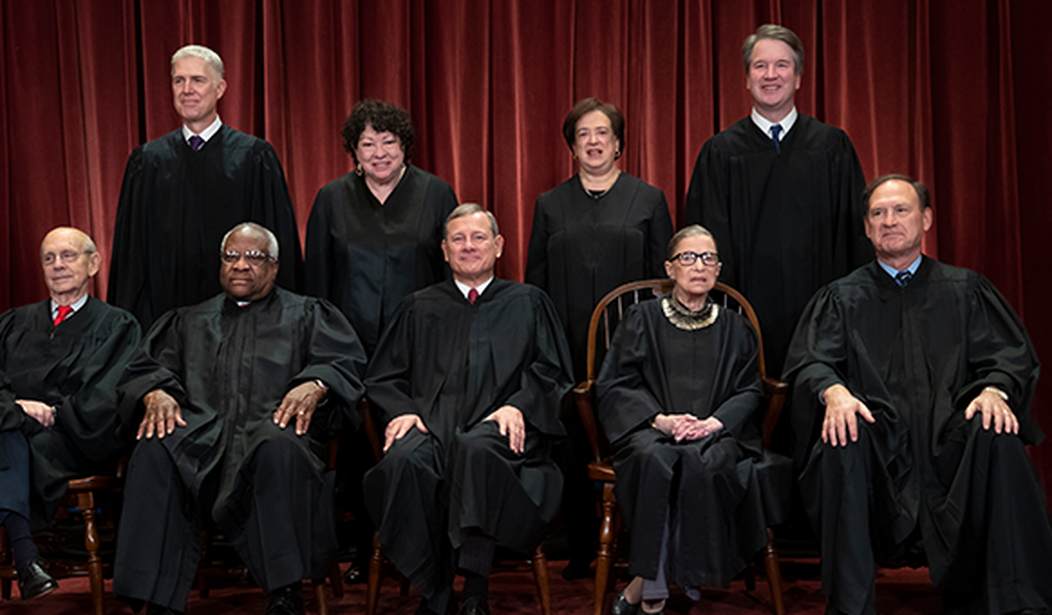The Supremes didn't determine that Trump has any sort of special right to build the wall, mind you; they simply declined to re-consider a lower court ruling that the administration could move forward with construction, assuming the project is authorized and funded by Congress. Whether that's a sound assumption is a separate issue. Chalk this up as a limited victory for the president and a blow to leftist environmentalists -- via Reuters:
The U.S. Supreme Court on Monday rebuffed a challenge by three conservation groups to the authority of President Donald Trump’s administration to build a wall along the U.S.-Mexico border, a victory for Trump who has made the wall a centerpiece of his hardline immigration policies...The justices declined to hear the groups’ appeal of a ruling by a federal judge in California rejecting their claims that the administration had pursued border wall projects without complying with applicable environmental laws. The groups are the Center for Biological Diversity, the Animal Legal Defense Fund and Defenders of Wildlife. Their lawsuits said construction operations would harm plants, rare wildlife habitats, threatened coastal birds like the snowy plover and California gnatcatcher, and other species such as fairy shrimp and the Quino checkerspot butterfly.
As Ed Morrissey points out, the federal judge who authored the decision that SCOTUS has effectively affirmed is none other than Gonzalo Curiel, whom candidate Donald Trump shamefully bombarded with racially-tinged attacks during the 2016 campaign. Judge Curiel stuck to the law, sided with Trump, and has been reinforced by the High Court. Of course, there's no guarantee that the wall will be built, given the two parties' disagreement on government funding priorities. The president wants $5 billion in federal outlays for the wall, but leading Democrats say their starting point for negotiations is $1.6 billion, a fraction of Trump's request (though Chuck Schumer has discussed the possibility that the total number could rise to $3 billion). As Republicans consider a short-term funding extension to avoid an ugly shutdown fight as Washington comes together to honor the life of President George H.W. Bush this week, Democrats are fighting amongst themselves:
Recommended
Not 30 minutes after a group of border-state House Democrats accused Chuck Schumer of betraying them on President Donald Trump’s wall, the Senate minority leader picked up the phone to protest. Retract your statement, Schumer urged Rep. Henry Cuellar last Thursday...“I said, ‘No, I’m not going to withdraw the letter because we don’t want you weakening House negotiations for Democrats,” Cuellar recounted of his conversation with Schumer. House and Senate Democrats are now openly sniping at each other over Trump's border wall, a division that could weaken their hand in critical spending talks over the coming days...But while some Senate Democrats are open to funding at least part of Trump's request, newly emboldened House Democrats want to hold the line and refuse to provide even a penny. Indeed, House Democrats and outside liberal groups fret that Schumer — and the broader Senate Democratic conference — are going to sell them out on the wall.
Winning the first midterm election of a relatively unpopular president's first term is rather easy, historically speaking. Governing is much harder, as Republican leadership learned in 2011 and beyond. We'll see where negotiations go -- whether this all plays out in the next few days, or two weeks from now. Who doesn't love self-created cliffs and crises at Christmas? Meanwhile, the rejection of wall opponents' appeal isn't the only victory conservatives scored at the Supreme Court in recent days:
Supreme Court Deals Unanimous, Welcome Blow to Administrative State in Frog Case https://t.co/sarR1aaGlf pic.twitter.com/5JnFUGTcCN
— National Review (@NRO) December 2, 2018
From Trump critic but solid conservative columnist George Will's latest:
Unanimity is elusive in today’s America, but the Supreme Court achieved it. Although the dusky gopher frog is endangered, so are property rights and accountable governance. Both would have been further jeopardized if the frog’s partisans in the U.S. Fish and Wildlife Service (FWS) had gotten away with designating 1,544 privately owned Louisiana acres as a “critical habitat” for the 3-inch amphibian, which lives only in Mississippi and could not live in the Louisiana acres as they are now. The eight justices (the case was argued before Brett M. Kavanaugh joined the court) rejected both the government’s justification for its designation and the government’s argument that its action should have received judicial deference, not judicial review...The 8-to-0 ruling was doubly beneficial. It was a recuperative moment for the court. And it was a chastisement of the administrative state, the government’s fourth branch, which is one too many.
One last SCOTUS note: Based on unusually lopsided and scathing oral arguments, it appears that defenders of abusive police property seizure practices (euphemized as "civil asset forfeiture") are destined for a bruising and deserved rebuke. If these tea leaves pan out, civil libertarians will rejoice:
"Welcome to the topsy-turvy world of civil asset forfeiture, also known as legalized theft." https://t.co/QkoO5Lb1Uu via @slate
— J.D. Tuccille (@JD_Tuccille) November 30, 2018
























Join the conversation as a VIP Member